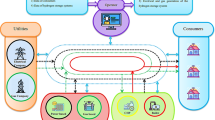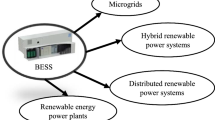Abstract
In recent years, Solar energy have been proven to be a cost-effective method for generating electricity with minimum environmental impact. The main objectives of this research paper in to model the Grid Interactive PV sources and explore the possibility of charging EVs (Electric Vehicle) using Solar sources in a more significant proportion. In this paper energy demand of the residential flats of 2900 kWh and EV charging load (20 Nos of Two-Wheeler & 24 Nos of four Wheeler) of 576 kWh is considered for study. The five-storied residential apartment of 40 flats was considered for installing the rooftop Solar plant to supply the required energy to EVs and domestic loads.Research paper explored the possibility of charging the EVs during day time with high renewable fraction i.e. using Solar Energy and Night time through grid Energy. Optimization of Solar sources was done based on technical, cost, and environmental factors using the Solar Pro tool. The Solar plant was optimized to 150 kW, and the energy output from the PV plant under shadow conditions is estimated as 186,236.43 kWh. The performance of the PV plant at loading conditions was evaluated with & without shadow mapping and actual weather conditions prevailing at the site. Financial Feasibility of charging EVs during day time using renewable sources and night time using grid energy is estimated. Sensitivity Analysis of EVs Charging at Grid energy tariff of Rs. 3 (Purchase Price), Rs. 4(Selling Price) & Rs. 4 (Purchase Price), Rs. 5(Selling Price) was carried out and corresponding cost factors such as Bill Reduction, Selling Price & Buying Price was calculated.Load flow analysis of the complete system consisting of PV source, Grid sources, and Load (EV and building domestic loads) was performed using the MiPower tool. The line losses, line / cable loading, and voltage level of each bus at maximum loading (EV and domestic load) conditions were evaluated. Crude oil and CO2 reduction are evaluated by charging EVs using Solar Energy as 47,863 L & 95,353 kg, respectively.














Similar content being viewed by others
Data availability
Data can be provided based on request.
References
https://afdc.energy.gov/fuels/electricity_benefits.html. Accessed 14 Jun 2023
Sachan, S., Singh, P.P.: Charging infrastructure planning for electric vehicle in India: Present status and future challenges. Reg. Sustain. 3, 335–345 (2022)
Baraniak, J., Starzyński, J.: Modeling the impact of electric vehicle charging systems on electric power quality. Energies 13(15), 3951 (2020)
Barman, P., Dutta, L.: Charging infrastructure planning for transportation electrification in India: a review. Renew. Sustain. Energy Rev. 192, 114265 (2024)
Aliasghari, P., Mohammadi-Ivatloo, B., Abapour, M.: Risk-based scheduling strategy for electric vehicle aggregator using hybrid Stochastic/IGDT approach. J. Clean. Prod. 248, 119270 (2020)
Asensio, O.I., Apablaza, C.Z., Lawson, M.C., Walsh, S.E.: A field experiment on workplace norms and electric vehicle charging etiquette. J. Ind. Ecol. 26, 183–196 (2022)
Singh, R.B., Shrivastava, N.A.: Viability analysis of self-governing hybrid electric vehicle charging system. In: 2021 International Conference on Control, Automation, Power and Signal Processing (CAPS). IEEE (2021)
Sun, X., Fu, J., Yang, H., Xie, M., Liu, J.: An energy management strategy for plug-in hybrid electric vehicles based on deep learning and improved model predictive control. Energy 269, 126772 (2023)
Ahmadi, S.E., Marzband, M., Ikpehai, A., Abusorrah, A.: Optimal stochastic scheduling of plug-in electric vehicles as mobile energy storage systems for resilience enhancement of multi-agent multi-energy networked microgrids. J. Energy Storage. 55, 105566 (2022)
Shen, Y., Hu, W., Liu, M., Yang, F., Kong, X.: Energy storage optimization method for microgrid considering multi-energy coupling demand response. J. Energy Storage 45, 103521 (2022)
Baqir, M., Channi, H.K.: Analysis and design of solar PV system using Pvsyst software. Mater. Today: Proc. 48, 1332–1338 (2022)
Khan, S.U., Wazeer, I., Almutairi, Z., Alanazi, M.: Techno-economic analysis of solar photovoltaic powered electrical energy storage (EES) system. Alex. Eng. J. 61, 6739–6753 (2022)
Rahmat, M.A., Abd Hamid, A.S., Lu, Y., Ishak, M.A., Suheel, S.Z., Fazlizan, A., Ibrahim, A.: An analysis of renewable energy technology integration investments in Malaysia using HOMER pro. Sustainability 14, 13684 (2022)
D’Agostino, D., Parker, D., Melià, P., Dotelli, G.: Optimizing photovoltaic electric generation and roof insulation in existing residential buildings. Energy Build. 255, 111652 (2022)
Minai, A.F., Usmani, T., Alotaibi, M.A., Malik, H., Nassar, M.E.: Performance analysis and comparative study of a 467.2 kWp grid-interactive SPV system: a case study. Energies 15, 1107 (2022)
Muthukumaran, T., Raj, P.A.D.V., Murugaperumal, K.: Feasibility analysis of electric vehicle charging in working places using hybrid renewable sources. In: 2022 IEEE 2nd International Conference on Sustainable Energy and Future Electric Transportation (SeFeT), pp. 1–6. IEEE (2022)
Muthukumaran, T., Raj, P.A.D.V., Murugapermual, K., Subramanian, N.P.: Feasibility analysis of PV/Wind/DG based hybrid energy system design for Indian educational institute. In: 2021 Innovations in Power and Advanced Computing Technologies (i-PACT), pp. 1–6. IEEE (2021)
https://www.lapsys.co.jp/english/common/download/manual_e_01.pdf. Accessed 01 Jun 2023
https://atandra.in/wp-content/uploads/2017/05/ALM-36-Brochure.pdf. Accessed 10 May 2023
https://e-amrit.niti.gov.in/standards-and-specifications. Accessed 05 Jul 2023
https://www.pluginindia.com/blogs/bharat-ev-specifications-for-ac-and-dc-charging-everything-you-need-to-know. Accessed 20 Jun 2023
http://www.solardesigntool.com/components/module-panel-solar/Trina-Solar/2935/TSM-315PD14/specification-data-sheet.html. Accessed 05 Jul 2023
Reniers, G., Talarico, L., Paltrinieri, N.: Dynamic Risk Analysis in the Chemical and Petroleum Industry, pp. 195–205. Butterworth-Heinemann, Oxford (2016)
Umar, N., Bora, B., Banerjee, C., Panwar, B.S.: Comparison of different PV power simulation software: case study on performance analysis of 1 MW grid-connected PV solar power plant. Int. J. Eng. Sci. Invent. (IJESI) 7(7), 11–24 (2018)
Khare, V., Khare, C.J., Nema, S., Baredar, P.: Modeling, cost optimization and management of grid connected solar powered charging station for electric vehicle. Int. J. Emerg. Electr. Power Syst. 23(4), 587–603 (2021)
Author information
Authors and Affiliations
Corresponding author
Additional information
Publisher's Note
Springer Nature remains neutral with regard to jurisdictional claims in published maps and institutional affiliations.
Rights and permissions
Springer Nature or its licensor (e.g. a society or other partner) holds exclusive rights to this article under a publishing agreement with the author(s) or other rightsholder(s); author self-archiving of the accepted manuscript version of this article is solely governed by the terms of such publishing agreement and applicable law.
About this article
Cite this article
Thulasingam, M., Periyanayagam, A.D.V.R. Modelling of PV sources & techno-economic of analysis of hybrid system for EV charging in residential buildings. Energy Syst (2024). https://doi.org/10.1007/s12667-024-00663-x
Received:
Accepted:
Published:
DOI: https://doi.org/10.1007/s12667-024-00663-x




